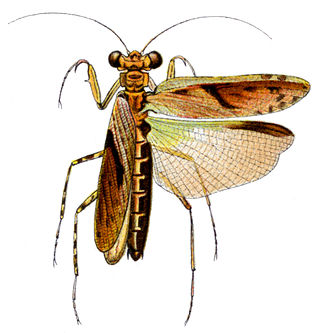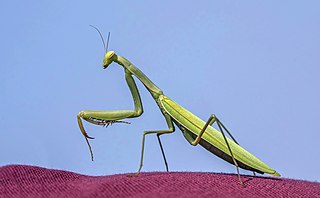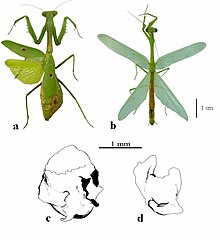
The Carolina mantis is a species of praying mantis of the subfamily Stagmomantinae.

The Chinese mantis is a species of mantis native to Asia and the nearby islands. In 1896, this species was accidentally introduced by a nursery tender at Mt. Airy near Philadelphia, United States. Tenodera sinensis often is erroneously referred to as Tenodera aridifolia sinensis because it was at first described as a subspecies of Tenodera aridifolia, but Tenodera sinensis is now established as a full species.

Mantidae is one of the largest families in the order of praying mantises, based on the type species Mantis religiosa; however, most genera are tropical or subtropical. Historically, this was the only family in the order, and many references still use the term "mantid" to refer to any mantis. Technically, however, "mantid" refers only to members of the family Mantidae, and not the 14 remaining families of mantises. Some of the most recent classifications have promoted a number of the mantid subfamilies to the rank of family, e.g. Iridopterygidae, Sibyllidae, Tarachodidae, Thespidae, and Toxoderidae, while other classifications have reduced the number of subfamilies without elevating to higher rank.

Empusidae is a family of plant-mimicking mantises, consisting of 10 genera, in two subfamilies. Unlike many other mantis families, the Empusidae are a monophyletic lineage. Empusidae mantises are ambush predators, with mouthparts adapted to feeding on other insects and small animals. The majority of Empusidae species are distributed throughout Africa, but they are also found in Southeast Asia and in the southern parts of Europe.

Metallyticus is a genus of praying mantis. It is the only genus in the monotypic family Metallyticidae. They are mostly found in South-East Asia. The species of the genus are dark, somewhat flattened and cockroach-like, and often with a cuticle that is reflective and metallic in appearance.

Amorphoscelidae is a family of mantises in the order Mantodea.

Iris oratoria, known by the common name Mediterranean mantis, due to humans first studying it in lands around the Mediterranean Sea, is a species of praying mantis. Its range is expanding in the Middle East, Western Asia and the United States.
Stagmomantis floridensis, common name larger Florida mantis, is a species of praying mantis in the family Mantidae. They are native to the south-eastern United States.

Stagmomantis is a genus consisting of 21 species of mantises native to the Americas.
Stagmomantis gracilipes, common name Arizona tan mantis, is a species of praying mantis in the family Mantidae. They are native to the south-western United States, Mexico and Central America.
Stagmomantis montana, common name Mountain mantis, is a species of praying mantis in the family Mantidae. They are native to Mexico and Central America. S. montana sinaloae has been identified as a subspecies.

Stagmomantis limbata, common name bordered mantis, bosque mantis, Arizona mantis, or New Mexico praying mantis, is a species of praying mantis native to North America, most prevalent in the south-western United States. This beneficial insect is green or beige in color and grows up to around 3 inches long.
Arizona mantis is a common name applied to various species of praying mantis native to Arizona, particularly:

Rhombodera is a genus of praying mantises native to Asia and possessing common names such as shield mantis, hood mantis, and leaf mantis because of their extended, leaf-like thoraxes.

Acanthopidae is a family of mantises consisting of 16 genera in the order Mantodea. The group was first formally split off as a separate family by the German entomologist Reinhard Ehrmann in 2002. In 2016, five genera were moved from Acanthopidae to the newly created family Acontistidae, but this has not been accepted in most recent classifications.

Mantises are an order (Mantodea) of insects that contains over 2,400 species in about 460 genera in 33 families. The largest family is the Mantidae ("mantids"). Mantises are distributed worldwide in temperate and tropical habitats. They have triangular heads with bulging eyes supported on flexible necks. Their elongated bodies may or may not have wings, but all Mantodea have forelegs that are greatly enlarged and adapted for catching and gripping prey; their upright posture, while remaining stationary with forearms folded, has led to the common name praying mantis.

The Stagmomantinae are a subfamily of mantids within the family Mantidae, found in the Americas.

Galinthiadidae is a family of 24 African mantis species in four genera.

Pseudovates is a genus of praying mantis in the family Mantidae. There are more than 20 described species in the genus Pseudovates, and are found in North, Central, and South America.














